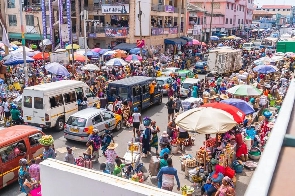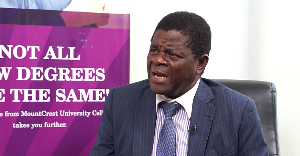Certainly, not even the most fanatical supporter of the ruling New Patriotic Party can say in all honesty that the barrage of complaints in the country – about the economy; galloping cost of living; unemployment; and ‘so much month left at the end of the money’ – are baseless.
So most of the reasons cited for the three-day demonstration in Accra by the group, ‘Democracy Hub’ (DH), obviously resonate with many people, especially corruption – probably the most popular word in current public discourse, although short on evidence.
Indeed, the slogan for the demonstration was ‘#OccupyJulorBiHouse’ – a clever word-play combining ‘Jubilee House’, the name of the seat of government, and the Ga language expression meaning ‘thievery’.
However, judged against the general situation, some developmental advances, it also raises the matter of whether one sees the ‘glass half full or the glass half empty’.
The first day of the protest, Thursday, September 20, 2023, witnessed the arrest of 49 people by the police, including some journalists, claiming that it was an unlawful assembly because DH had been served with an injunction – a claim the group denied. After some hours, they were released on bail.
It had been reported earlier that there was a disagreement with the police over the proposal to picket Jubilee House, which the police would not allow as it’s a Security Zone, and the group’s refusal to change their plan.
Yes, the national Constitution guarantees freedom of assembly, but under the Public Order Act, there has to be agreement with the police on the arrangements, especially the route.
I thought the purpose of such a demonstration, was to get results, thus there would be a petition, their suggestions as to what the government should be doing. Therefore, I was surprised to learn from the media, that a petition was not part of their plan. As explained in rather indelicate language by lead convenor of the demonstration, Mawuse Oliver Barker-Vomarwor, “we don’t hand over petitions to anybody; they use it for toilet roll.”
But, I’ve been wondering, if they have not been presenting petitions to authorities, how does he know where such documents end up?
In any case, if they really want their grievances to be given consideration for the progress of the country, why start the engagement by labelling the other side thieves?
Or was the demonstration just to serve as a reminder to the Government of the poverty and associated challenges in the country?
But is there anybody in Ghana who doesn’t’ know the economy is in distress? Solutions are what are needed!
Still, evidently, measures being taken to revive the economy are not reducing the stress on the populace fast enough, as we’re all living a hand-to-chin existence, battling kenkey-and-fish issues. This is why I, for one, would have welcomed any new ideas presented by Democracy Hub to assist in the solutions finding.
Strangely, the impression is being created by DH and others, that under President Nana Akufo-Addo Ghana has abandoned democracy and has been virtually turned into a police state. A police state indicates a country where people’s freedoms, especially to express political opinions, have been terminated.
But is that the situation in Ghana under the NPP government, when people even insult and lampoon the President and his Vice at will, as regularly happens in some Ghanaian media?
One of the DH placards had the intriguing inscription “OUR DEMOCRACY IS IN PERIL. WE NEED TO SAVE THE REPUBLIC.”
How is Ghana’s democracy under threat? Is it because the police wouldn’t allow them onto the Jubilee House premises?
In which non-democratic country would any group have the courage to organise an event under an offensive hashtag insinuating that the presidency is ‘a house of thieves’?
Anyway, the bottom line is that there is lack of money in most pockets, evidently the main reason for the discontent.
Yet, I have faith that the economy will recover. Evidently, the foundation is being laid, with technological initiatives from the digitalisation programme being spearheaded by Vice-President Dr Mahamudu Bawumia. Notably, they are becoming so much a part of our lives that we take them for granted.
Dr Bawumia’s digitalisation agenda for Ghana, is so pronounced that he has been scornfully accused by detractors of running away from his field (economics and banking), and his position as Head of the Government’s Economic Management Team, to hide in digitalisation because he has no solutions for the economic problems.
However, I find Dr Bawumia’s explanation for his passion for the digitalisation transformation agenda very credible: “In fact, it is because of the economy that I’m focusing on digitilisation, because without building those pillars, our economy will just not be able to stand on its own feet.”
In a recent interview with African Business, he said “(with digitalisation), you are able to bring in efficiency in the delivery of public services, you are able to reduce corruption (emphasis added); digitalisation is a way of lifting up the poor to participate fully in society.
“We introduced mobile money interoperability. Today in Ghana anybody with a national ID card can open a bank account sitting at home.
“We want to leverage technology for economic growth with inclusion,” Dr Bawumia said.
Naturally, it’s difficult to count, or even see blessings when one is wondering how to feed the family. Yet, despite the hardship, there are advances. However, again, perhaps it’s a matter of whether one sees the glass half empty, or half full; whether one is an optimist or a pessimist.
“The optimist sees the glass as half full.
“The pessimist sees the glass as half empty.” (American writer Claes Jonasson.)
Jonasson’s concluding thoughts on the glass metaphor are: People who focus on whether the glass is half full or half empty miss the point. The glass is refillable.
Still, the impression should not be created that nothing is working in Ghana. There are steady improvements. Currently even in Accra markets, with some food items one gets much more for one’s money than a few months ago.
And it’s not just market prices good news. Recently, my neighbourhood, in Accra, had a very pleasant surprise: the start of a rehabilitation of our long neglected roads! We woke up one morning to the unmistakable sounds of heavy road construction vehicles in the area, and there has been continuing activity.
Similarly, I believe that development projects are being implemented all over the country.
Furthermore, thanks to the digitilisation drive, using my mobile phone, I’m able to pay my TV Licence; renew National Health Insurance; pay my property rate; and my water bills. Most satisfactory of all, in 2021, I was able to renew my passport using the online application system and it was delivered to me at home.
No stress involved; no queuing at any office; nobody hinting that one would have to ‘do something’ in order to be served, the benefits of the ruling NPP’s digitalisation programme; but of course these are just a few of them. Now the Electricity Company, too, has started an online service.
Understandably, when lack of money in pocket is what concerns most people, the technological advances may seem insignificant, but I appreciate Dr Bawumia’s viewpoint that it’s a critical foundation to uplift the economy.
Obviously, technology rules the modern world. Therefore, leaders must demonstrate ability to come up with creative technological strategies.
Whether you believe that the present Ghana hardship is due solely to mismanagement by President Akufo-Addo, Vice-President Bawumia and Finance Minister Mr Ken Ofori-Atta, or whether you agree that external negative developments have affected Ghana, too, like other countries, one thing is clear: the cost of living crisis is a global phenomenon, not in Ghana alone.
The Ghana glass may be half empty or half full; but obviously it can be refilled. Personally, I have the conviction that the NPP is capable of refilling the glass and returning the country to the pre-Covid-19 period when Ghana’s economy was being praised by the international financial institutions.
ajoayeboahafari@yahoo.com
Opinions of Thursday, 28 September 2023
Columnist: Ajoa Yeboah-Afari



















